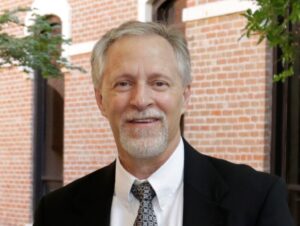I remember thinking about writing my dissertation on Focus on the Family. Thank God I did not. We have enough self-loathing evangelicals who spend most of their time writing critical books about those to the right of them on American political issues. Instead, I ended up writing about the fascinating story of post-communist moral education in the former Soviet Union. It led me to undertake qualitative research at seventeen different Russian and Ukrainian cities in 1994 and 1995.
I came back not only with mounds of data for my dissertation but also with a Canadian girlfriend I had met in Russia that I wanted to marry. I needed a full-time job (there’s nothing like the love for a woman to motivate a man)! It just so happened that the Southern California pastor with whom I was co-teaching a Sunday School class, Craig McConnell, told me about a friend of his who worked at Focus on the Family in public policy. They needed someone to work on religious liberty, character education, and education-related policies. Those three things just happened to be my areas of academic specialization.
So before completing my dissertation, I traveled to Focus on the Family to interview for a job with John Eldredge (yes, the author of Wild at Heart). John, who was my boss when I worked there, later shared a story at my good-bye party that I was not their first pick. Apparently, the other applicant had shown up unshaven in blue jeans and a ragged shirt. I had shown up a little better dressed and shaven (although I did leave my zipper down for the first hour of the interview). So, I got my first real full-time job with benefits due to my dress habits (and hopefully my other qualifications). Most importantly, I also got married less than six months later.
Admittedly, I never saw the job as something I’d do long-term. I knew I wanted to finish my dissertation and then leave to teach overseas in Russia. My wife and I never bought furniture. We knew we were pilgrims in Colorado Springs. Still, during my short time at Focus on the Family, I grew to appreciate Dobson’s often unremarked-upon strengths but also foresaw a key weakness.
Taking Care of Your Supporters and Workers
A few weeks into the job, I got my first personalized note from Dr. Dobson. It simply read, “Get on it, Perry.” I did not realize but later learned that Dobson had created a system whereby certain items with a blue sheet were to be responded to within a week. If they were not, Dobson was notified. If there is one thing I appreciated about Dobson, it is that he cared about his supporters and wanted to make sure they heard back if they had a concern.
I can say the same for the work environment at Focus. As opposed to some ministries that try to suck the life out of you, Focus provided a wonderful professional environment. Dobson would sometimes encourage folks in our office who were staying late to stop working and go home to their families. While I was there, he also added a week of vacation. I have hard horror stories from other Christian ministries. Not at Focus. He cared for his employees.
Intellectual Integrity
While working at Focus during that time, I remember attending a session at Colorado College led by Barry Lynn, President of Americans United for Separation of Church and State (originally named Protestants and Other Americans… a rather anti-Catholic name). As I listened to his stump speech meant to raise money and awareness about the dangers of the Religious Right, I thought to myself, “You’re actually just as fear-mongering as the Religious Right.” In fact, he was worse. Most political advocacy groups, whether on the right or left, play loose with the facts in their publications and support letters.
What I appreciated about Dobson was that he cared about truthfulness. If his radio show were on a public policy topic, he would have that issue person in the studio for fact-checking. He sent out a monthly letter that was footnoted. Moreover, he had those of us on the policy team check his footnotes for this monthly newsletter (and this was before the current state of the Internet). I learned lots of things through that process (especially about fake quotes). Dobson did not always take our team’s advice, but I appreciated his significant efforts to bring scholarly rigor and truthfulness to the arena of public policy. Most policy advocacy groups on both sides, even at the highest levels today, are not worried about truthfulness.
Courage and Taking Risks
I also appreciated Dobson’s courage. One of the quotes he wanted to use in his letters was attributed to Martin Luther (although our fact-check team found Luther never said it). The quote referred to having the courage to stand amidst the issues that are important at the time. It is easy to have courage in hindsight (e.g., of course, everyone thinks they would have stood against slavery or Hitler). It is much harder to take moral stands in the present day when the conflict is hot.
Academics are not necessarily risk takers. They enjoy tenure, benefits, and a steady paycheck like most people. That’s why I was always impressed that Dobson walked away from a secure academic position at the Children’s Hospital in Los Angeles to start a ministry that eventually grew to employ over 1300 people—95% of whom had nothing to do with public policy but simply worked to help families. Most academics do not have that type of entrepreneurial courage or the willingness to take controversial, public moral stands.
Perhaps I should place myself in that group. This is the first time I have specifically named my one-time employer in a publication. Even moderate Christian academics have their prejudices against Focus on the Family, so I have always thought it wise to avoid the topic. I also did not list my employment with Focus on the Family on my CV when I interviewed for my job at Baylor University. And knowing what I know now, it was a wise thing I did not. Now, on the occasion of Dobson’s death, however, I want to publicly thank Dobson for creating Focus on the Family and demonstrating a unique Christian example from which I benefited and learned.
Later Disagreements
Dobson also taught me that anytime you do something worthwhile, you’re going to have major critics and enemies. The recent CT obituary mentioned a couple of Dobson’s. Kristen Du Mez critiqued him for his patriarchal tendencies, a claim that I think totally misunderstands what animated Dobson. It is clear she only knows him through books interpreted through the usual feminist ideological lens one finds in academia. It would be interesting to find out how many women Dobson featured and gave a platform to on his radio broadcast.
What I found frustrating about Dobson was who he trusted (and some of those were conservative women). Due to his scope of responsibility, he had to entrust lots of people with the evaluation of things he discussed. At times, he entrusted those who were shallow critical thinkers but effective political activists. For example, Christianity has its share of boundary keepers, and Dobson could play this role for parents regarding certain things that he may not have examined closely (or were examined by the wrong people in the organization). Those of us in the policy department defended the importance of Christians reading widely and Christian parents not being scared of various types of controversial or “dangerous” reading. That did not necessarily happen later. Thus, after returning to the States from Russia and getting my job at Baylor, I would write in defense of the Harry Potter series and against Focus’s stance in the Austin American-Statesman and the English Journal.
That was not the major disagreement I had with Dobson’s approach. During my time there, I always thought more could be done about certain issues or areas, such as dealing with poor families. Often, that would have involved crossing political lines and making common cause on a particular issue that I thought had strong biblical support. For various reasons, Dobson knew his influence was on one side of the political divide and kept his focus and advocacy there. Political loyalties came first.
That ultimately led to his major intellectual mistake and inconsistency. Whereas, when I was at Focus, Dobson would criticize Bill Clinton for the Monica Lewinsky tryst and maintain that a president must have a certain level of character, he abandoned those previous views this past decade when it came to Trump. In the first term, that approach seemed to work out fine (if one is judging by pragmatics and not Christian ethics or even positive psychology). Trump appointed conservative justices who eventually overturned Roe v. Wade and did not do lasting damage to core constitutional norms because people like Mike Pence and others maintained adherence to the rule of law. American checks and balances held.
This term is different. Trump simply does not understand and/or care about the rule of law. I could name numerous examples, but his handling of the duly passed law by Congress outlawing TikTok, which has been approved by the Supreme Court, shows basically how Trump works. That being said, authoritarian rule by executive order or Justice Department letters is something that Democrats have also practiced extensively in the past decades.
Of course, once power changes hands, all the legal norms and traditions that one side destroyed are used by the other side. When it comes to the centralization of power in the American political system and the undermining of the rule of law, both parties have played their part. The religious liberty protection groups that Dobson helped support and build will not be enough to protect religious liberty if the rule of law is simply ignored by whoever is in power. After all, most countries have laws on the books protecting religious liberty—it is the legal and political culture, though, that matters.
Unfortunately, the general Christian, because they have not traveled or read extensively, likely does not understand how great a cultural inheritance respect for the rule of law is. Trump is squandering major portions of that inheritance this term. Thus, Dobson’s ultimate legacy will be soiled by support for a devious and destructive politician, much like Billy Graham’s legacy was tarnished by his support for Richard Nixon. And Trump is even more authoritarian in style and has even more grievously undermined American historical norms. Major evangelical leaders who are not in a full-time political vocation, whether on the right or left, often think their thirst to be close to and influence political power will not change or harm them. It almost always does.




